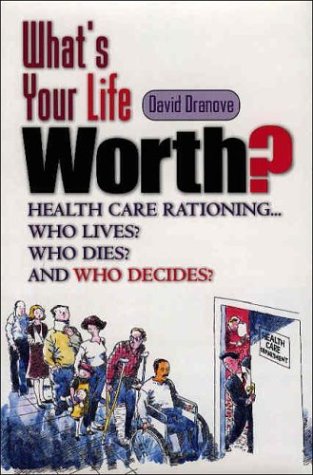This article in Bloomberg presents a difficult situation that we’re likely to be struggling with more and more in the future. Something to think about – how should health care be rationed? With a weakened economy, increasing unemployment, loss of savings, etc., is our health care next to go?
Cancer Patients Lose Shot at Longer Life in U.K. Cuts (Update1) 
By David Altaner and Bruce Rule
Excerpt:
Jack Rosser’s doctor says taking Pfizer Inc.‘s Sutent cancer drug may keep him alive long enough to see his 1-year-old daughter, Emma, enter primary school. The U.K.’s National Health Service says that’s not worth the expense.
Rosser, 57, was told the cost of Sutent, 3,140 pounds ($4,650) per treatment for his advanced kidney cancer, was too high for the NHS — the government agency that funds the nation’s health care. The resident of the town of Kingswood, in southwest England, has appealed the decision twice, and next month may find out if his second plea is successful.
“It’s immoral,” Rosser’s wife, Jenny, said. “They are sentencing him to die.”
The NHS, which provides health care to all Britons and is funded by tax revenue, is spending about 100 billion pounds this fiscal year, or more than double what it spent a decade ago, as the cost of treatments increase and the population ages. The higher costs are forcing the NHS to choose between buying expensive drugs for terminal patients and providing more services for a wider number of people.
About 800 of 3,000 cancer patients lose their appeals for regulator-approved drugs each year because of cost, Canterbury- based charity Rarer Cancers Forum said. The U.K. is considering whether to make permanent a preliminary ruling that four medicines, including Sutent, are too expensive to be part of the government-funded treatment of advanced kidney cancer…
…“There is a view that all treatments should be available. Unfortunately, that’s not possible,” said Peter Littlejohns, NICE’s clinical and public health director. “There is a limited pot of money.”
He said the four cancer drugs provide a “marginal benefit at quite often an extreme cost” and that the agency had to keep in mind that funds spent on the medicines could be used elsewhere to help others at a greater value. “Those are the hidden patients, the ones who benefit from the things the NHS does spend money on,” Littlejohns said.
…Of the 3,000 applications for exceptional funding for cancer patients a year, the most-requested drug was Sutent, said the Rarer Cancers Forum, which focuses on cancer cases that fall outside the more common ones such as colon, breast, lung and prostate.
Sutent, which stops cancer cells from dividing and chokes off a tumor’s blood supply, was first approved for European use in July 2006. Kidney cancer sufferers taking the drug had a median survival rate of 26.4 months, according to a study presented at the American Society of Clinical Oncology in May.
Five Years to Live
New York-based Pfizer provided NICE with Sutent cancer- survival data that were released after its review began to try to persuade the agency to reverse its decision, and has offered to make the first treatment free, company spokeswoman Emily Bone said.
On Nov. 4, the government proposed giving NICE more flexibility in approving higher-cost drugs and allowing patients to buy the medicines themselves without losing access to government-funded health care. Final recommendations on the proposals aren’t due until early next year and Rosser can’t wait that long for his medicine, Spall said.
Rosser, of Kingswood, England, was diagnosed with cancer four days after Emma was born in July 2007. After operations in August and March to remove a kidney, adrenal glands and bone tumors, he was told he might live two to five years. In July, he was told by doctors that Sutent would help, but the South Gloucestershire Primary Care Trust said it wouldn’t pay for the treatment.
`Very Expensive’
“I read the letter and I burst into tears,” said Rosser, who was forced to retire from his air-conditioning and sheet- metal company because of the illness.
South Gloucestershire, the trust that includes Rosser’s home, accepts applications for Sutent funding only for exceptional cases, said Ann Jarvis, director of commissioning at the trust, in an e-mail. “Unfortunately for very expensive drugs, if they are proven to only provide a small benefit we have to prioritize other treatments.”
…Jenny Rosser said the policies seem aimed more at saving cash than treating people.
“It seems like a money-saving exercise,” she said. “If a patient dies, tough.”


